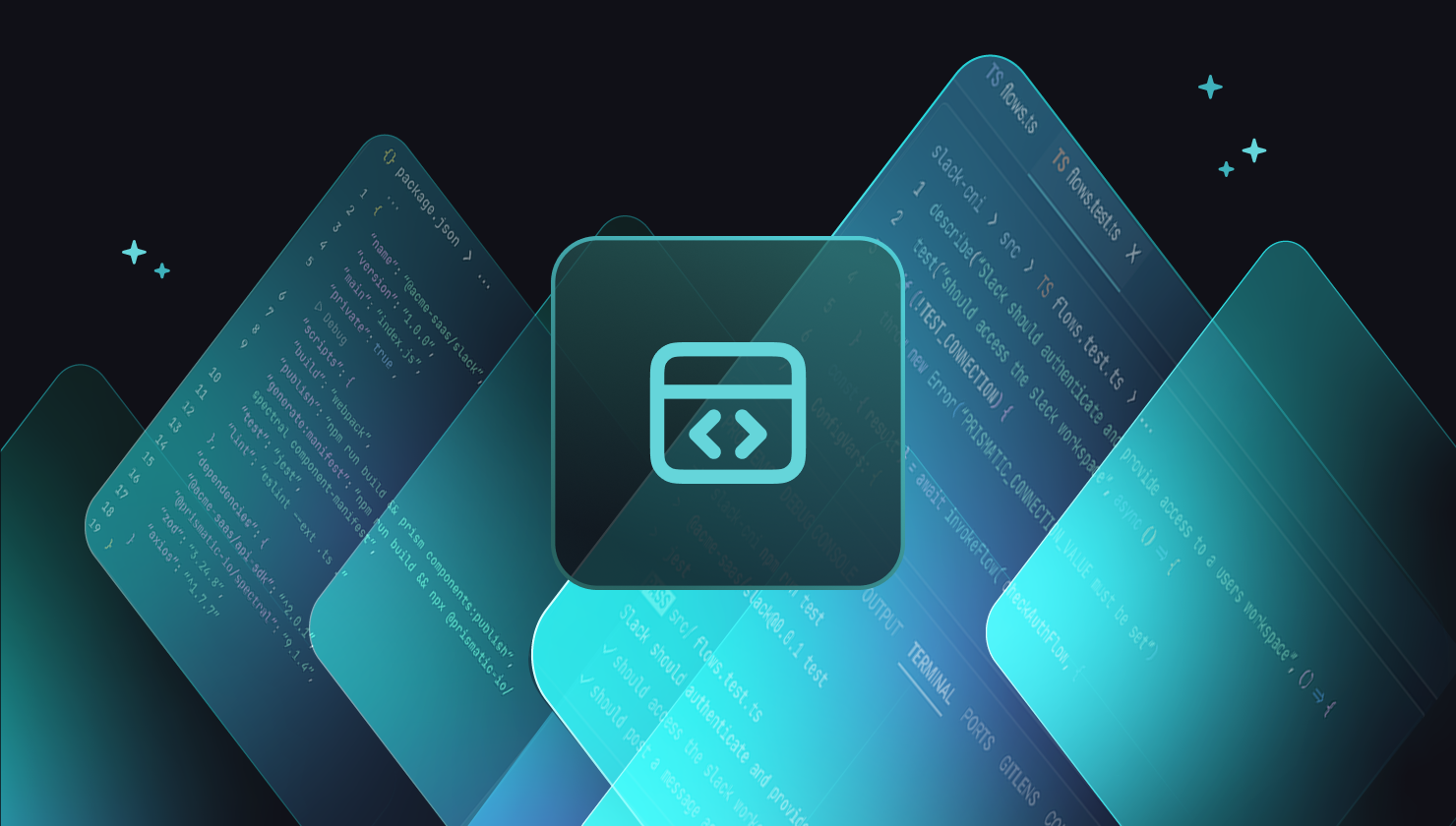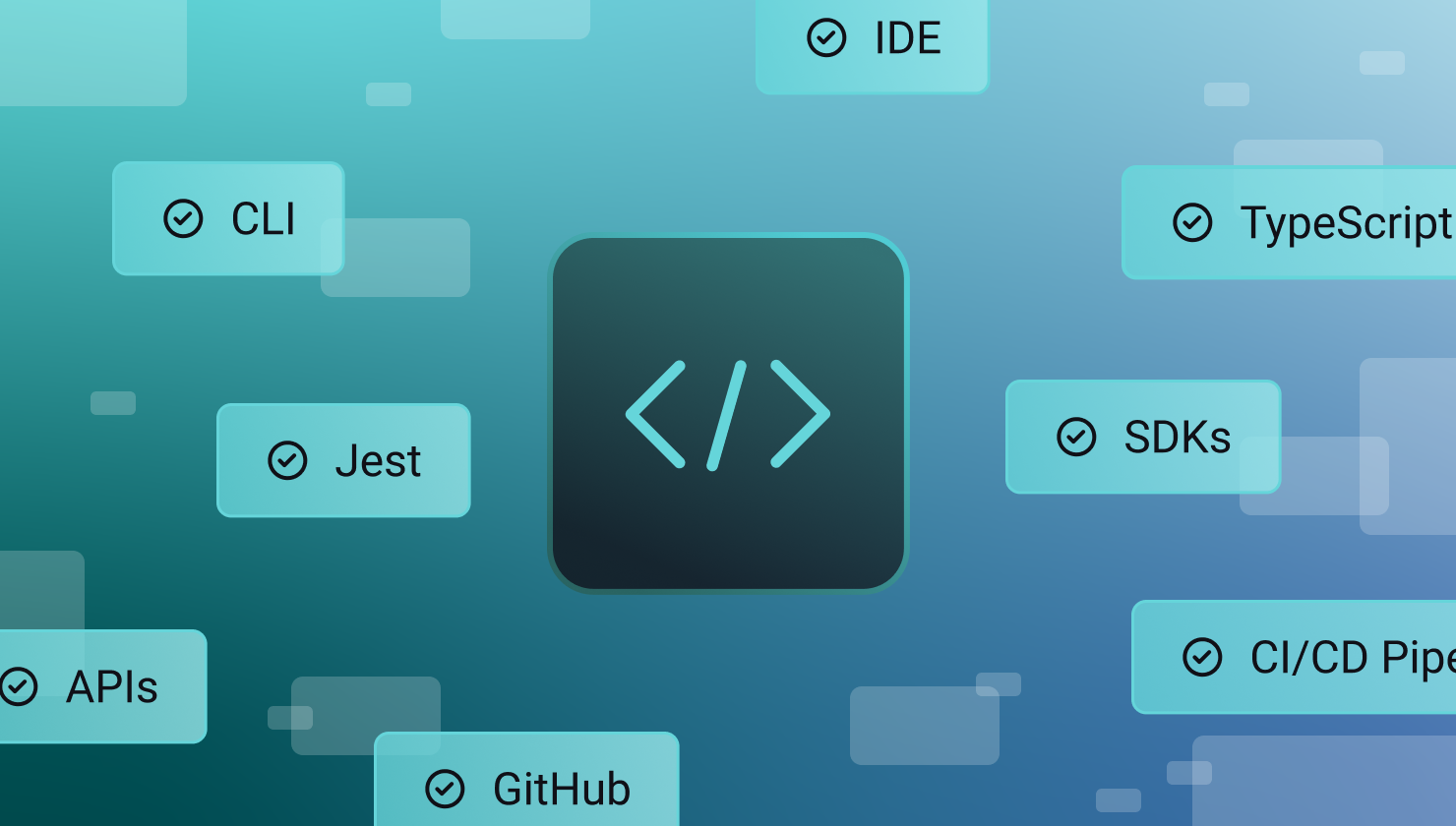Today, we're releasing updates that significantly improve the code-native development experience on Prismatic. These capabilities make building, testing, and deploying integrations entirely in code faster and more intuitive.
Why this matters for B2B SaaS integration development
B2B software companies face a critical challenge: they need to ship integrations quickly without sacrificing the flexibility their customers demand. Meanwhile, devs want to use their preferred tools and processes, not learn yet another proprietary interface.
As AI-assisted development becomes standard practice, most integration platforms aren't ready for this shift. Devs expect their AI coding assistants to understand the tools they're working with, but without proper context, these assistants can only offer generic help.
These updates address all three needs, transforming how teams build and deploy integrations on Prismatic.
What's new: Four major improvements to code-native Integration development
1. Prism MCP server: AI-powered integration development
What it is
A Model Context Protocol (MCP) server that enables AI coding assistants like Claude and Cursor to understand and work with Prismatic's SDK to build code-native integrations and custom components.
What you can do
- Generate integration flows using natural language prompts
- Scaffold new components and test configurations automatically
- Run tests and debug issues with AI assistance
- Generate code scaffolds and boilerplate instantly
Why it matters
AI coding assistants are powerful but lack context about Prismatic's SDK and integration patterns. The Prism MCP server bridges this gap, making AI-assisted development helpful for building integrations and components.
Technical detail
The Prism MCP server is specifically designed for integration development and is distinct from Prismatic's core MCP server infrastructure.

2. VS Code extension: Your complete integration development environment
What it is
A full-featured extension that brings Prismatic capabilities directly into VS Code and Cursor.
What you can do
- Run test executions and view detailed logs without leaving your IDE
- Pull existing integrations from your Prismatic instance to work on locally
- Configure instances through an embedded config wizard
- Manage authentication seamlessly via the Prismatic CLI
Why it matters
Context switching kills productivity. Every time devs need to jump between their IDE and browser, they lose focus and time. This extension eliminates that waste, keeping everything within your development environment.

3. Improved component manifest generation: Simplified component management
What it is
A new streamlined approach to generate and use component manifests directly within your integration project.
What you can do
- Generate component manifests with a single command:
npx cni-component-manifest <component-name> - Use components in your code without installing them as npm packages
- Test with realistic mock data using example payloads
Why it matters
Managing component packages across different projects was cumbersome and error-prone. Teams often struggled with versioning, dependencies, and synchronizing components across environments. This new approach simplifies component usage and makes it more intuitive for devs and AI agents.
Technical detail
Component manifests are now generated via API calls rather than requiring you to publish private component manifests to npm, eliminating an entire layer of complexity from the installation process.

4. Improved component referencing: TypeScript-first configuration
What it is
Comprehensive TypeScript support for defining connections and data sources in configuration wizards and triggers in flows.
What has improved
- Full TypeScript hints and validation that work in real-time as you type
- Cleaner, more intuitive syntax for defining user configuration experiences
- Complete parity with low-code configuration capabilities
Why it matters
Configuration wizards are critical for customer self-service, enabling your users to set up their own integrations without engineering support. However, defining them in code was frustrating due to poor type support and unclear syntax. These improvements make configuration definition as straightforward as writing any other TypeScript code.

The impact: Measurable improvements in integration development
These updates collectively reduce the time to build and deploy integrations by eliminating key friction points in the development process:
- No more context switching between tools and environments
- No more fighting with package management and dependencies
- No more guessing at configuration syntax or API structures
- AI assistants that actually understand what you're building
Our customers building with code-native integrations have already seen:
- 95% reduction in integration development time (Yoti)
- 10x faster deployment cycles (Duro)
- 50% of new revenue from integration-enabled features (Cofactr)
These aren't just incremental improvements; they represent a fundamental shift in how quickly teams can respond to customer integration requirements.
Get started today
Ready to transform your integration development process? Here's how to get started:
- Install the Prism MCP server: Access our GitHub repository for installation instructions.
- Add the VS Code extension: Download directly from our developer resources.
- Try the new component commands: Review our updated documentation for examples.
- Explore the complete documentation: Visit our comprehensive developer guide.
Questions or feedback? We want to hear from you. Join our developer community or contact your account team to share your experience and help shape the future of code-native integration development.




